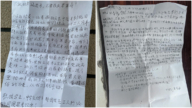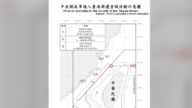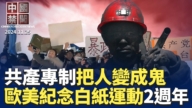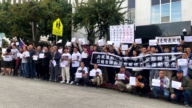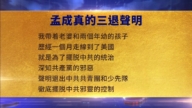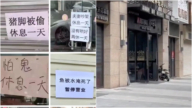【新唐人2014年03月24日讯】从今年2月中旬开始,人民币开始了一波快速持续贬值,到目前为止贬值幅度已经超过3%,超过了去年全年升值幅度。人民币贬值带来的后果也很严重:热钱外流、经济增速继续下滑、房地产萎靡等。那么,面对当前的经济形势,中共将如何应付呢?请看报导。
在外汇交易市场,人民币目前跌到了1美元兑人民币6.2255元,是去年3月以来的最低水准。
对此,美国《华尔街日报》指出,目前人民币兑美元已经跨过了6.20元的重要红线。《华尔街日报》引述市场参与人士的话说,如果人民币跌破这个水准,将会触发投资产品账户追加保证金,从而可能导致人民币汇率变得更加不稳定。
名为“目标可赎回远期合约(target-redemption forwards)”的衍生品,能在人民币不大幅走贬的情况下,给持有人带来稳定收入。
全球最大和最具影响力的金融服务机构之一的“摩根士丹利”估计,自去年以来,中国投资者购买了3500亿美元这种离岸远期合约,“下档保护”多设在6.20附近,目前随着人民币贬值已经损失了35亿美元。如果人民币继续贬值,那么投资者的损失将继续增加。
中共官媒也指出,人民币贬值将加速富豪破产潮来临,那些涉及大宗商品进行对外融资交易的富豪,例如﹕铜、铁矿石、大豆、棕榈油、橡胶、锌、铝、黄金以及镍等领域的投资者,都会受到牵连。
美国“南卡罗莱纳大学艾肯商学院”教授谢田认为,目前的人民币贬值3%,这还在中共能承受的贬值范围之内,因为它可以通过抛售手中的美元来让人民币升值。但是人民币继续贬值,中共能不能做,就是大问号了。
美国南卡罗莱纳大学艾肯商学院教授谢田:“造成人民币贬值最大的因素,一个是中国外贸不那么强劲,开始走向衰退,造成人民币贬值的第一个压力﹔第二个,很可能是热钱不断的流出。”
统计资料显示,2月份中国的“出口、消费、投资”这“三驾马车”的资料都不如意。
今年2月份,中国出口总值1140.94亿美元,同比下跌18.1%﹔而进口总值则为1370.82亿美元,同比增长10.1%﹔贸易逆差达229.89亿美元,这是近两年以来的最大逆差。另外,同期全国社会消费品零售总额增长11.8%、固定资产投资同比增长17.9%,这都是2013年以来的新低。
央行3月18号公布的资料也显示,2月份外汇占款新增仅1282亿元,但是过去四个月外汇新增量都在3900亿以上。这也说明2月份有大量的热钱在向外流。
香港“大和资本市场(Daiwa Capital Markets)”公司日前发布研究报告宣称,随着“美联储”缩减量化宽松,加上信贷风险上升,未来将引发大批资金从中国出逃,从现在起到明年年底,人民币预计将贬值10%。
谢田:“如果人民币继续贬值、热钱外流、经济增速下滑,它很可能会降低存款准备金率,也有可能降低利率,用其他方法来宽松信贷,增发钞票。”
实际上,当前的人民币剧烈波动对中国经济产生了巨大影响:2月份北京楼市的成交量是近6年来的最低值,而浙江宁波地产企业“兴润置业投资有限公司(Zhejiang Xingrun Real Estate Co.)”,最近因房价下跌导致资金链断裂,面临破产。
美国《华尔街日报》指出,外界担心已久的中国房地产泡沫破裂正在逼近。
不过,资料显示,2013年,房地产占中国GDP的16%,占新增贷款的26%,贡献了中共政府财政收入的39%。
如果房地产急剧放缓,那么,中国经济的增长点在哪里?
谢田认为,中共在出现严重经济危机时,只能重新走回当年胡温体制下的“用通胀保经济”那条路,就是通过制造通货膨胀,把经济危机转嫁到中国老百姓头上。那是中共经常走的、也是唯一能走的一条路。
采访/易如 编辑/宋风 后制/舒灿
Where Is China Going after RMB Hits “Red Line” For Losses?
Since mid-February, the RMB has experienced a steady and
rapid depreciation by more than 3%,
exceeding the total appreciation over last year.
The devaluation has consequently caused the outflow
of hot money, a decline in economic growth,
and dropping of real estate.
How will the Communist regime face the economic crisis?
Please follow our report.
The RMB fell the lowest
from March last year to 6.2255 per dollar.
The Wall Street Journal (WSJ) reported that with the RMB
now crossing the 6.20-per-dollar threshold,
“Market players have warned that breaching that level
would trigger collateral calls on investment products that could unleash even more instability in the currency.”
The leveraged contracts such as target-redemption forwards
are structured to pay out monthly if the yuan has passed a specific threshold against the dollar.
One of the world’s largest and most influential financial
services institutions “Morgan Stanley" estimate,
since last year, Chinese investors bought $ 350 billion of
such offshore forward contracts,
" downside protection " are situated in close to 6.20 , now
with the devaluation of the RMB has lost $ 3.5 billion.
If the yuan continues to depreciate, then
the loss to investors will continue to increase.
China state-run media says that the RMB devaluation will
accelerate the bankruptcy of the rich.
Tycoons who are doing business in the popular trade sectors,
such as copper, iron ore, soybeans, palm oil, rubber, zinc,
aluminum, gold and nickel, will be affected.
Xie Tian, Professor of University of South Carolina Aiken
suggests that RMB depreciation of 3% is under the acceptance
range of Chinese Communist Party (CCP).
Because the CCP can use methods of selling dollars to appreciate RMB.
However, will the CCP carry on selling dollars if the yuan
continues to depreciate?
Xie Tian: “The major factors causing RMB depreciation are:
China’s foreign trade isn’t strong enough, it started declining;
The possiblity is that hot money repeatedly outflows.”
The data shows that in February, China’s exportation,
consumption, and investment were not as good as expected.
In February, China’s total exports are US$114 billion,
which dropped 18.1% year-on-year.
The imports value is US$137 billion in total,
which increased 10.1% year-on-year.
A trade surplus reached $22.99 billion, which
becomes the biggest trade deficit.
In addition, the national consumption goods retail sales
increased 11.8%, the fixed-asset investment increased 17.9%
year-on-year, these fell to the lowest since 2013.
China’s central bank released data on March 18 shows
that in February the funds outstanding for foreign exchange
rose by 128.2 billion yuan ($20.75 billion),
however, in the past four months, foreign reserves have
increased 390 billion yuan.
This shows that a lot of hot money out flowed in February.
Daiwa Capital Markets’ report says that as US stimulus cuts
and heightened credit risks, many funds will flow out of China,
RMB will lose 10% by the end of next year.
Xie Tian: “If RMB continuously depreciates, hot money
outflows and economic growth rapidly declines,
it is likely to lower the deposit reserve ratio and interest rate,
easing credit by other methods, ie printing more money.”
Actually, the current volatility of RMB has a huge impact
on China’s economy.
In February, Beijing house sales reached their
lowest for the past six years.
Zhejiang Xingrun Real Estate has faced bankruptcy because
housing prices dropped leading to fund chain breaking.
WSJ points out that fears have raised about
a housing bubble burst getting closer.
Data shows that in 2013, property takes up 16% of GDP,
accounts for 26% of new loads,
the Chinese regime contributed 39% of revenue.
If the real estate slows down sharply,
then where is China’s economy growth point?
Xie Tian says that facing a serious economic crisis,
the CCP only can go back to the inflation path where
Hu Jintao and Wen Jiabao had been.
In other words, the CCP creates inflation to
transfer the crisis onto the Chinese people.
This method is the only path, it is often used by the CCP.
Interview/Yiru Edit/Shongfeng Post-Production/Shucan


